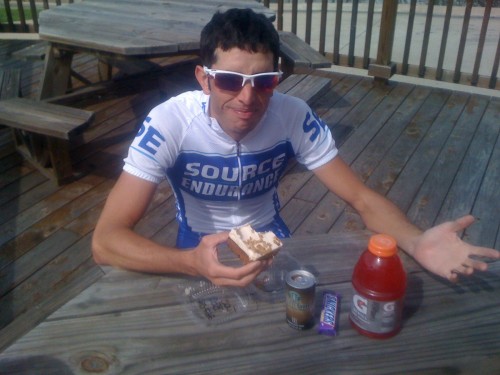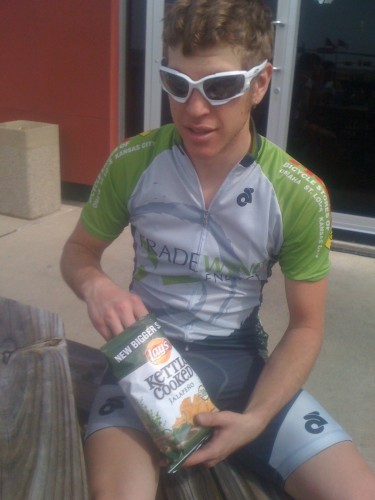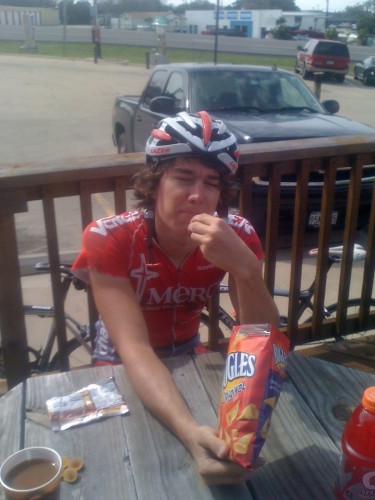I’ve spent a fair amount of time messing with different diets/nutrition throughout my cycling career. I was a vegetarian from 14 until the first time I went to Europe in 1980, so that was nearly 6 years. Then I kind of was a poultry and fish only meat guy, plus the normal vegetables, etc. That is kind of how I still eat most of the time, but I don’t have anything against red meat really other than I don’t think that fat from it does you much good.
One thing that I truly believe is that cyclists, and athletes in general, are way too consumed by what they put into their mouths. We are pretty lucky burning the amount of calories that we do. That means we get to eat a lot more food than the average person. By eating this massive quantity of food, we get way more nutrients than the average person also. There are a few things that we need more of being athletes, but the main thing is calories. I think after you eat a certain amount of “good food”, it doesn’t matter much where the rest of the calories come from. I know a lot of you are going to disagree with me on that statement, but you’re going to you have hard time convincing me otherwise.
I’d forgotten how much food that these 20 year old guys eat. They are eating probably twice as much food as Bill, Adam or I. Yesterday we all rode around 6 hours, close to 110 miles, and it was amazing the quantity of calories consumed during the day. Ben has got some wheat allergies and other food stuff going on. Austin seems to eat just about anything he can get into his body. But both of them are eating constantly.
I did a study with the government in one winter when I was 20 years old. They paid me $20 a day for nearly 4 months to sit up in a lab in Grand Forks North Dakota to train while eating 3 different diets. The diets were a saturated fat diet (70% of the calories), a polyunsaturated diet (same 70%) and a carbohydrate diet (same). Each was for around a month long. Lab techs weighed the food I ate down to 1/100th of a gram and I did max and sub-max VO2 tests twice a week. I was eating 5500 calories a day, mainly riding inside most of the time since the winter starts super early up there. I’d guess I was probably eating another 1500 calories or so a day more when I was racing outside during the season at that time. Anyway, I felt a ton different eating those diets. I could barely stomach the saturated fat diet. I felt sick and horrible nearly the whole month. I was a vegetarian when I went in and my cholesterol was off the low end of the charts when I first got there. After 4 weeks of that diet, it was 100 points off the high end of the range. But, that being said, my output on the bicycle for a max VO2 test or a one hour sub-maximal test didn’t hardly change at all. On any of the diets.
I ate pretty good then. Lots of fresh vegetables, fruits, nuts, whole grain breads. But usually every night when I was on the road, such as the Tour of Texas, the Coor’s Classic, etc. I’d eat a pint of Hagen Daz ice cream. Nearly every night. When I got to that study in North Dakota and had to eat the 5500 calories, it was nearly impossible for me to stomach the quantity of food they were serving. It was something like 2 chicken breasts boiled in oil, plus a whole pyrex family size serving bowl of mashed potatoes, made with non dairy creamer, plus 8 slices of bread and a couple large glasses of whole milk. They finally had to split my 3 meals a day into 5 meals, just so I could eat the right number of calories and not loose weight. I was used to eating way higher caloric food that took up much less volume – ie. ice cream.
I think the movie Super Size Me was bullshit and completely unfair to McDonalds. That movie was about gluttony, plain and simple, and had nothing to do with the quality of food his was eating. It was all about the quantity of the food he was trying to consume. I’d bet you a million dollars I could eat at McDonalds for a year straight, 3 meals a day, and not have any ill effects or performance issues in cycling.
When I first started racing I used to take a bunch of vitamins. A handful a couple times a day. Now I take fish oil at night, when I have them, and just about nothing else. I figure that by the amount of food I consume, it would be nearly impossible not to get enough nutrition from it. I’ve been using salt for about 6 months now. I’ve never put any salt on my food, but a Swiss nutritionist came and talked to the BMC guys last year and told the riders to eat as much salt as they could stomach. I’ve always had a cramping problem, so I figured it couldn’t hurt to try it for a while. Other than that, I eat just about anything I want. I think I eat pretty good. I don’t eat hardly any processed food, but am not really against it, I just don’t like it as well as fresh food.
So, to wrap this up, I don’t think you need to worry so much about what you eat. That is unless you are just consuming too much and are showing the signs of that. Other than that, eat what you like because one of the big fringe benefits of riding your bike all day is you can eat a lot of food all night.








Im not fat by any means but I do have some fat around my stomach that will not go away. I rise quite a bit but not as much in the winter. I think I spend summer trying to lose what was gained over the winter. I also think my body has figured out how to cheat and store the fat. I’ve been trying to eat right now with the live strong calorie counter and it helps me make better choices. So far I’ve lost 2lbs in 1 week. Thanks for the blog.
I’ve tried lots of food combinations, but when doing 12- or 24-hour MTB races, I eat what is probably considered junk food (chocolate bars, Gatorade, peanut butter/jelly sandwiches, Coke) along with pasta and fruit. I fuel up quickly between laps and get back out.
In a road or gravel road century, I try to carry a minimal amount of food and grab what is available at pit stops, which is usually GUs, Power Bars, and some type of sports drink. That probably limits my good choices, but there’s more of a sense of urgency in those events.
A good greasy diner breakfast a few hours before the start has worked well for me, but timing is everything. The load must be lightened before getting on the bike.
There is no universal diet for racers, you just have to listen to your body. If your body can tolerate a huge amount of junk, then listen to your body.
If you want to go out of your way to try something a little different, I recommend just about any cut of bison.
Generally, the cuts are very low calorie, very low fat, and really low cholesterol. Nice rich flavor.
If you are cooking it yourself, then it cooks fast like a boneless, skinless chicken breast. Leave it on too long and it gets dry. Just like over cooking a chicken breast.
Since you don’t consume much processed food, salt intake would be recommended, for endurance sport athletes.
I agree with you on your premise that cyclists can eat just about whatever you want. And as long as you have variety, you are getting all you need in vitamins and minerals. I have found that to be true in my experience and education. But I also recognize that there is enough variance in people(activity level, metabolism, digestive response, etc.) that each person has to find what works for them.
In a former lifetime, I ran 70-100+ miles/week. Two or three intense workouts + race most weeks. Always ate a clean diet for the first 3000-3500 calories, but after that, there had to be some calorie-dense foods (ice cream etc.). There’s just no way to eat 4000 calories day in/day out without some fluff in the diet. Whenever I tried eliminating all junk, I’d lose weight (muscle mass), which made me run slower.
I suspect the ‘chip thing’ has to do with salt lost. On a hot day I will turn black shorts to sparkly white (with salt from my sweat) in as little as 2 hours. On these “salty days” I will crave foods like chips, peanuts, etc.
I have read about pros “teaching” their bodies to digest fats and proteins for efforts of 5+ hours. I would love here what the BMC guys eat during the racing season.
Having been a wrestler in high school and college and now a competitive cyclist I have found the need to “tweak” my diet a bit to get to a desired weight. Once there however I have been pretty much able to eat what I want within reason which definitely helps in the happiness department.
One issue I see with athletes in general is many cases of moderate to severe weight gain post athletic career or during the off-season. Many athletes tend to continue with a higher calorie diet because they feel that they can , even though they are not getting the calorie burn from their usual athletic endeavors.
For many folks cutting back on the calorie intake while not working out or racing as much as they once did seems to be a real mental challenge .
I guess we get used to that feeling of satiety that a high calorie diet gives us and aren’t so willing to give it up…
Great post Steve.
Your right. We eat a lot and are mostly taken care of simply by volume.
Great post… I think our on-the-bike calorie efficiency is key to understanding this – you’ve been riding so long, you are so well adapted vs the younger guys, you just don’t need the calories.
Flip it around, think about when you do off-the-bike stuff like skiing or contractor work, how tired / sore you get – I bet you burn tons of calories doing that, just guessing.
Also – did you see the guy who lost weight on the Twinkie diet? He’s at K-State.
http://www.cnn.com/2010/HEALTH/11/08/twinkie.diet.professor/index.html
I have been a “foodie” for years. I have seen food fads come and go. The gluten free diet being the newest one. Seriously, what would I do without my post race beers?
I appreciate your perspective on food intake. I think listening to what your body really wants is important. For different athletes this is A variable. For me, I feel better and have more energy when I cook my own food. That’s why racing out of town without a kitchen can be a challenge.
Just a cup of coffee over 110 miles???? I would have bonked without some calories.
I really enjoyed doing that USDA/North Dakota lab nutrition study with you, Steve. Many funny aspects about that whole program (they also weighed anything that came out of us to the 1/100th of a gram if you recall), but the saturated fat diets were indeed very hard to stomach. Shows how wrong that is for distance athletes, as I think may have been the VO2 max tests right after stepping out of bed and onto ergometer at 6:00AM, with the physiologists treating result numbers like sacred empirical data. I thought at least a good portion of the results were simply how motivated we were at that difficult time… I tend to think that I could have eaten a little better diet when I was racing in terms of the ice cream and lots of food in general right before bed. Would it have been better to move it to other times in the day? I don’t know. I still have a habit of eating before bed, not as much of course, and have heard a respected naturopathic doctor here in Vancouver and others say that night is a good time to let the liver rest and not work too much on processing food while sleeping. Interesting to consider, as I don’t know if it was really possible for me at 20 to have gotten enough calories otherwise while riding several hours/day. I remember the lab staff stood in total disbelief of my “diet log” I showed up with. They basically threw it aside and had me start over by pointing to rubber food samples to represent what I ate in one meal (and still disbelieved firmly!). They gave us what they thought was certainly way too much food, then had to up my calories three times, also to 5500/day, before my weight levelled off from a crash dive. Hilarious. Let’s not repeat that one, OK?
In a former life I raced MTB’s for fun, and found my niche was as an endurance racer. While my diet during the races was very strict, I was first and last to the beer and hot dog lines after the race. I stayed thin and felt great, even though I ate “crap” and drank too much. As soon as I quit racing I put on 40 lbs and felt like trash. 5 years later I have found moderation, and feel alive again, but it was hard to quit eating and drinking everything I want. Still a daily struggle.
Hilarious pictures – but on a serious note does anyone out there have high cholesteral and take meds for it ? I’ve wondered how it effects cyclists. I’m still not buying it, but I’ve been told by dr’s i should take something. It ranges between 230-250 and has for over the past 10 yrs.I’m just not ready for that and I don’t want it screwing up how I feel.
I think it depends a lot on the ratio of HD to LD cholesterol. Athletes sometimes tend to have a lot of the “good” cholesterol, which skews the numbers some. But, I’m far from an expert on it.
Being a cyclist and have a 16 year old competitive cyclist daughter a 7 year son and my wife who is now riding more than ever we always seem to have bare cupboards. I spent 20+ years in the food industry and do the main job of cooking in the house.. I ..we… try to eat as much fresh fruits and veggies as we can and hammer home the whole grain and or unprocessed crap. Last spring we got a camper to use for races etc.. to have a home base and to be able to cook so we were not eating out at restaurants. I almost feel that being a cyclist is a curse because of the amount of food that we do eat. We have to work hard to make sure that what we buy we eat and have very little waste..
That said I would not trade cycling for any other sport or past time.
Now if I can just find a way to get a Grocery store to sponsor me and family I can cut down on the food bill.
YES! K-State reference! GO CATS!!!
Interesting post, and comments. I will disagree with you about “Supersize Me” though. having seen the movie many times, I can tell you that he is simply eating three supersized meals at McDonald’s every day for a month. Not any more. I bet you would gain a lot of weight in that month if you stopped all exercise.
Unfortunately so many people do this for years, not one month. That’s why this country is so fat. No exercise plus lots of McDonald’s meals = fatsos everywhere.
Does anyone have more info on the salt thing? It doesn’t make any sense to me. If humans sweat pure salt sure, but sweat is wet and only has about 1/6 of a teaspoon of salt per liter. One teaspoon of table salt has 2325mg of sodium in it… the average American diet contains 3400mg sodium (according to the CDC)… This isn’t the first time I’ve heard about endurance athletes being told to eat as much salt as they can; if anyone has some solid research for this I would love to see it.